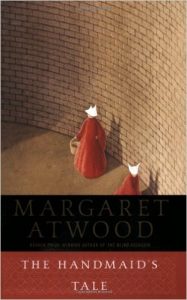
Book Review: The Handmaid’s Tale by Margaret Atwood
I thought the hardest part about writing a review of a book that has been famous as long as The Handmaid’s Tale has been would be the fact that most people who want to read this book already have, or at least, already know they want to read it. That, and anything there really is to be said about the book has already been said, and probably by more talented critics than myself.
But that is not true. The hardest part about writing a review of The Handmaid’s Tale, a book first published in 1986, is how relevant it still is, almost 30 years later. And sadly, that comment is not a tribute to Margaret Atwood’s writing ability. It is a condemnation of our society – a society that is still trying to wrest control of women’s bodies from the women themselves, a society the separation of Church and State sometimes seems to be hanging by a thread, a society where everyone is concerned about who is listening and watching.
In The Handmaid’s Tale, the government of the US has fallen, and, at least in the region where the book is set, an ultra-religious group has seized control. All second marriages have been declared invalid, the men in them likely killed, the women, if have had children, given a choice between becoming “unwomen” and sent to work in radioactive wastelands or “handmaids”, essentially concubines whose sole purpose is breeding, and the children removed from their parents and given to powerful families in the new government to raise.
The premise here is that fertility rates among men and women have fallen to all-time lows. Very few children are conceived, and a high percentage that are have severe birth defects. Science has been rejected, and the blame for loss of fertility is all placed on women. So if a powerful man’s wife does not conceive, he can get a handmaid.
There are timeless aspects of the story. It is a story about people, how they are flawed, how power corrupts, how people seem either inclined to look for hope or to reject it entirely. The Handmaid’s Tale is one of a will to survive, a strength to find hope, even in terrible circumstances. And that is beautiful.
My only problem with this book are the final two chapters called “Historical Notes” which, while it does show that the society in the book has passed into history and the terrible conditions for women are no longer in existence, still does not really add much to the book for me. The Handmaid’s Tale was powerful all on its own. Now, I will admit to a personal bias against epilogues in general. And at least this one did not make me like the book less, as some have done. But still, if you stop at the Historical Notes, you are not really missing anything.
I would recommend this book to just about anyone. When my daughter is older, I will encourage her to read it. I can only hope that it will not seem quite so contemporary then.



